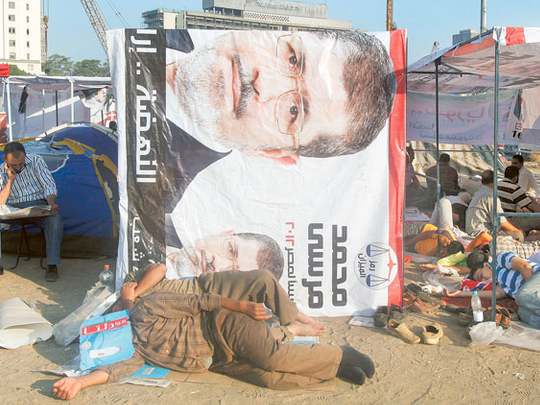
Cairo Egypt is a land of angry, puzzled faces. The sense of balance — if one ever existed in a country where chaos is as ancient and enduring as the pyramids — evaporates in whispers of unease. From bread lines to cafes and from stately neighbourhoods to slanting shantytowns, Egyptians simmer with disgust over their unsated revolution.
Heroes and villains slip in and out of narratives as the man responsible for the turmoil — Hosni Mubarak — lies near death, or so the public has been told, in a military hospital overlooking the Nile. His countrymen yearn to move beyond his 30-year rule and impenetrable visage, but he haunts them even in his pallor, an aged patriarch refusing to set free the nation he treated as belonging to him, his jailed sons and his wife of countless jewels.
Egyptian news reports late Tuesday that said Mubarak was “clinically dead” sent fireworks into the night and cheers among the banners blowing in Cairo’s Tahrir Square. But like so much else in Egypt, things were not as they first appeared. Officials hurried out their own statement: Mubarak, sentenced to life in prison this month for complicity in the murder of hundreds of protesters in the uprising that toppled him last year, was actually in critical condition and on life support. The fireworks had stopped and the cheers faded long before Wednesday’s first light.
Suspicion
Many believed that the army had exaggerated the fallen leader’s ailments as a ploy to move him from a prison hospital to the more comfortable military complex. Such suspicion has persisted throughout a series of dire announcements on Mubarak’s health — a few coming at sensitive times in his legal ordeal — including reports that emerged later Wednesday that Mubarak was in a coma.
“I didn’t buy the news of Mubarak’s death because he’s died many times before. They keep provoking us. It’s like they’re sticking their tongues out at the people,” said Magid Tawfiles, a university student in Cairo. “Nothing has changed. We’re tired, fed up and divided. I’m constantly confused.” Yousri Abdul Razzaq, an attorney for Mubarak, attributed the suggestions that his client was near death to media rumours. He said Mubarak was transferred to the military hospital after receiving improper medical treatment in Tora prison. “His health is improving,” Abdul Razzaq said, “and he’s stable.”
Since Mubarak departed from his palace by helicopter on February 11, 2011, celebrations have erupted and abruptly ended, like passing storms: The army seized power; everyone was happy. The generals stayed too long; many were outraged. The Muslim Brotherhood was respected; suddenly it was not. An Islamist-dominated parliament was elected; Egypt’s highest court dissolved it. On and on it goes, good news veering into bad. Tensions rose further when the national election commission said Wednesday that announcement of the winner of last weekend’s presidential runoff would be delayed a few days. The ruling military, which, like Mubarak, is loath to relinquish its grip on the state, has shorn the president’s office of much of its power.
Political threat
The projected winner is Muslim Brotherhood candidate Mohammad Mursi, a conservative, whose ascendancy poses a political threat to the authority and riches of the secular Supreme Council of the Armed Forces, or SCAF. “There is no doubt SCAF is behind all of these back-to-back decisions that are wearing us out,” said Omar Shawqi, a writer. “People don’t even want to talk about politics. The military has created a sense of confusion in the street.... Nobody trusts anybody right now.” Between unsettling revelations and fear of violence, Egyptians recall those bright wintry days of 2011 when the world watched in wonder as they swarmed colonial-era Tahrir Square with placards and songs to bring down the modern-day pharaoh. They bragged back then that their revolution would inspire the Arab world to a new epoch. They don’t murmur such promises much anymore. Their rage and disappointment are too great. They survive — bricklayer, fishmonger, Twitter wizard and banker — with conflicting emotions. Activists, inexperienced and overwhelmed, speak of a new rebellion. The Brotherhood and revolutionary groups drew thousands into Tahrir on Tuesday night. But many others are weary of unprecedented crime, demonstrations and economic hardship.
Ahmad Shafiq, a Mubarak ally and Mursi’s presidential challenger, promised law and order and an end to turmoil and, despite his links to the fallen leader, drew the support of millions of voters. Perhaps the 18 days it took to overthrow Mubarak gave Egyptians a false sense of how simple it would be to uproot the tendrils of the iron-fisted state he long ran.
It took a Western-backed civil war in Libya to oust Muammar Gaddafi and months of protest and bloodshed in Yemen to force out President Ali Abdullah Saleh. The body count in Syria has climbed to more than 10,000, yet President Bashar Al Assad still seems firmly in power. Egyptians have heard little to reassure them of late amid the pyramids and temples rising over the Nile. Mursi and Shafiq are both claiming victory, and the Ahram Online news website quoted a security official as saying the military expected a “major wave of rioting and unrest” incited by the Muslim Brotherhood should Shafiq, a former air force general, be elected. The delay in releasing the runoff results — authorities said they were investigating complaints by the candidates — prompted the Brotherhood to call for a sit-in against what it said were attempts by Mubarak’s old guard to steal the election. Barbed wire has been unspooled, thousands of soldiers have been called up, from Cairo to Suez. Egyptians hunker, sensing no hopeful denouement. “Nobody in politics is thinking about the well-being of Egyptians right now. We are paying the price,” said Nermin Nagdy, a government worker. “Here in Luxor, everyone lives on tourism and agriculture. We need stability for our economy to improve. We are waiting ... to know who the next president will be and what powers he will have.”
Los Angeles Times












